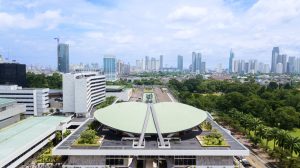Thousands of demonstrators clashed with police in the Indonesian capital yesterday, during protests against new pay rises and benefits for lawmakers.
The demonstrations took place outside the House of Representatives building in central Jakarta. In order to protect the walls of the parliament complex, police deployed tear gas and high-pressure water cannons to disperse the crowds, which were made up predominantly of students and political and labor activists. By late afternoon, Bloomberg reported, “clashes had spread to a nearby shopping district, where they hurled sharpened bamboo sticks and rocks at the police.”
During the protests, a 21-year-old ojek (moto-taxi driver) named Affan Kurniawan was killed after being run over by a police vehicle during the protests. Kurniawan’s death, which was captured by phone cameras and posted widely on Indonesian social media, has prompted outraged calls for accountability that are likely to swell into further protests in the days to come.
Yesterday’s protests were intended to voice discontent about a proposed new housing allowance for Indonesian lawmakers totaling 50 million rupiah per month ($3,057), an amount equivalent to nearly 10 times the minimum wage in the capital for this year. Legislators also receive 12 million rupiah for food and 7 million rupiah for transport, on top of a base salary of 6.5 million rupiah.By contrast, the average national monthly income in Indonesia is just 3.1 million rupiah.
As one Indonesian social media user wrote in an English-language post on X last night, “How can ordinary people survive in a country where lawmakers grant themselves luxuries worth nearly ten times a worker’s salary?”
According to a report in the Jakarta Globe, the protesters have six major demands: an end to outsourcing and low wages, a halt to mass layoffs with the creation of a special task force to manage job cuts, labor tax reforms, including raising the non-taxable income threshold and removing taxes on severance pay, holiday bonuses, and retirement savings. Bloomberg quoted one protester as saying, “Parliament must be dissolved. Do not retreat. Our fight is not over.”
Yesterday’s protest follows similar scenes on Monday, when a smaller crowd of demonstrators was met with a similar barrage of tear gas and high-pressure water as they attempted to breach the parliamentary complex. Police detained 312 protesters during the Monday protest, including 205 minors.
While the protests were set off by the proposed increase in parliamentary pay and benefits, they have tapped into a deeper current of discontent with the country’s current trajectory under President Prabowo Subianto, particularly the widening gap between rich and poor. According to the Bloomberg report, a number of economic frustrations have contributed to the discontent, including the rising cost of basic foodstuffs and education, as well as mass layoffs, primarily in the textile industry.
Frustrations have also been exacerbated by property tax hikes imposed by local governments, a response to Prabowo’s recent budget proposal, which has cut central funding to the regions and placed more responsibility on regional authorities to raise revenue.
In a post on X, Eve Warburton, a research fellow at the Australian National University, described the protests as a reflection of “the class gap between voters and politicians.”
She added, “This gap only becomes salient when economic conditions change – recent mass layoffs have left people feeling insecure, and labor informality is rising.”

































